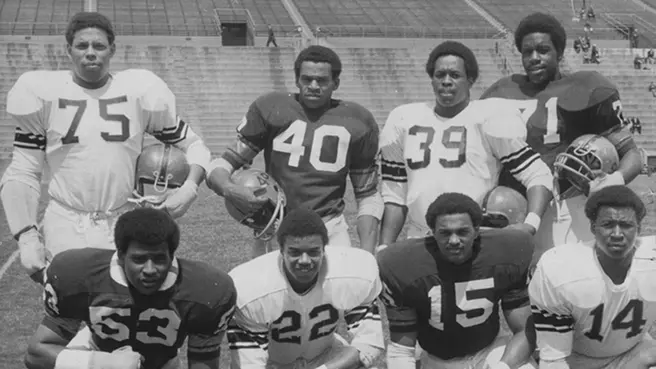Syracuse 8

When the Syracuse University football team took the field to play the Orange's home opening game on September 26, 1970, they did so with nine talented players noticeably absent from the team. These nine African American men were not on the field because they chose to boycott the Syracuse University football program until their request for changes was met. The nine players, who were known as the Syracuse 8, made their stand at a significant personal cost. The sacrifice made by Greg Allen, Richard Bulls, John Godbolt, Dana Harrell, John Lobon, Clarence "Bucky" McGill, A. Alif Muhammad, Duane Walker, and Ron Womack ultimately brought about many much needed changes to Syracuse University.
Starting in the Fall of 1968, a group of African American players on the Syracuse University football team expressed concerns within the football program. In doing so, The Syracuse 8 requested the hiring of an African American assistant coach and better academic support and medical care for all football student-athletes. In April 1970, when their requests went unmet, the group of African American players began their boycott of spring football practice.
Despite multiple meetings with Chancellor John E. Corbally and other University representatives, progress was slow and tensions continued to mount. Threatened by Syracuse Mayor Lee Alexander to reinstate the nine players or have the home opener against the University of Kansas cancelled, Chancellor Corbally chose to reinstate the Syracuse 8. The boycotting players refused to sign a statement of loyalty because they felt it placed the blame for the conflict on them. Supporters demonstrated at Syracuse’s football home opener against Kansas.
The Trustee, Faculty, and Student Committee commissioned by Corbally in the fall conducted a thorough investigation. In a report released on December 10, 1970, the committee published a 38-page report declaring the affair “an act of institutional racism, unworthy of a great University.” Finding the athletic department “showed an unwarranted insensitivity” and was overly dismissive of concerns raised by African American student-athletes on the team, the committee recommended changes to Syracuse University Athletics, which Chancellor Corbally approved.
The courageous stand made by Allen, Bulls, Godbolt, Harrell, Lobon, McGill, Muhammad, Walker, and Womack did result in real change within Syracuse University. The University came to see that the actions of the Syracuse 8 were justified and the changes they had fought for were needed. In 2006, Syracuse University formally recognized the contributions made by the Syracuse 8 by awarding them the Chancellor’s Medal for Extraordinary Courage.

Timeline of Events:
Spring 1969 – The Syracuse 8 request the hiring of an African American assistant coach and better academic support and medical care.
April 14, 1970 – The Syracuse 8 stop attending Spring practice and vow not to return until an African American coach is hired.
August 19, 1970 – The Syracuse 8 return to the team, but are suspended for boycotting Spring practice.
August 25, 1970 - Chancellor John E. Corbally announces that the Syracuse 8 may return, if they sign an agreement justifying the suspensions.
August 27, 1970 – The Syracuse 8 choose not to sign agreement and continue boycott.
Fall 1970 - Chancellor Corbally commissions a Trustee, Faculty, and Student committee to conduct a thorough investigation.
September 22, 1970 - Chancellor Corbally reinstates the Syracuse 8 so the home opener vs. University of Kansas is not canceled, as threatened by Syracuse Mayor Lee Alexander.
September 27, 1970 – The Syracuse 8 choose to boycott the home opener vs. University of Kansas.
September 27, 1970 – Syracuse University loses to University of Kansas. After the game, students protest outside of Archbold stadium. Riots ensue on Marshall Street with police intervening. The Syracuse 8 announces its boycott will continue.
December 8, 1970 - The Trustee, Faculty, and Student Committee publishes a 38-page report declaring the affair “an act of institutional racism, unworthy of a great University."
October 21, 2006 - The Syracuse 8 return to campus to be honored with the Chancellor’s Medal and receive Varsity Letterman jackets.
Spring 2007 - Syracuse Athletes establishes “The Syracuse 8 Courage Award,” given annually as part of the ‘Cuse Awards to a student-athlete who has shown courage in the face of adversity.
September 2022 - Syracuse Athletics honored this group of men with a mural of their history.
Starting in the Fall of 1968, a group of African American players on the Syracuse University football team expressed concerns within the football program. In doing so, The Syracuse 8 requested the hiring of an African American assistant coach and better academic support and medical care for all football student-athletes. In April 1970, when their requests went unmet, the group of African American players began their boycott of spring football practice.
Despite multiple meetings with Chancellor John E. Corbally and other University representatives, progress was slow and tensions continued to mount. Threatened by Syracuse Mayor Lee Alexander to reinstate the nine players or have the home opener against the University of Kansas cancelled, Chancellor Corbally chose to reinstate the Syracuse 8. The boycotting players refused to sign a statement of loyalty because they felt it placed the blame for the conflict on them. Supporters demonstrated at Syracuse’s football home opener against Kansas.
The Trustee, Faculty, and Student Committee commissioned by Corbally in the fall conducted a thorough investigation. In a report released on December 10, 1970, the committee published a 38-page report declaring the affair “an act of institutional racism, unworthy of a great University.” Finding the athletic department “showed an unwarranted insensitivity” and was overly dismissive of concerns raised by African American student-athletes on the team, the committee recommended changes to Syracuse University Athletics, which Chancellor Corbally approved.
The courageous stand made by Allen, Bulls, Godbolt, Harrell, Lobon, McGill, Muhammad, Walker, and Womack did result in real change within Syracuse University. The University came to see that the actions of the Syracuse 8 were justified and the changes they had fought for were needed. In 2006, Syracuse University formally recognized the contributions made by the Syracuse 8 by awarding them the Chancellor’s Medal for Extraordinary Courage.

Timeline of Events:
Spring 1969 – The Syracuse 8 request the hiring of an African American assistant coach and better academic support and medical care.
April 14, 1970 – The Syracuse 8 stop attending Spring practice and vow not to return until an African American coach is hired.
August 19, 1970 – The Syracuse 8 return to the team, but are suspended for boycotting Spring practice.
August 25, 1970 - Chancellor John E. Corbally announces that the Syracuse 8 may return, if they sign an agreement justifying the suspensions.
August 27, 1970 – The Syracuse 8 choose not to sign agreement and continue boycott.
Fall 1970 - Chancellor Corbally commissions a Trustee, Faculty, and Student committee to conduct a thorough investigation.
September 22, 1970 - Chancellor Corbally reinstates the Syracuse 8 so the home opener vs. University of Kansas is not canceled, as threatened by Syracuse Mayor Lee Alexander.
September 27, 1970 – The Syracuse 8 choose to boycott the home opener vs. University of Kansas.
September 27, 1970 – Syracuse University loses to University of Kansas. After the game, students protest outside of Archbold stadium. Riots ensue on Marshall Street with police intervening. The Syracuse 8 announces its boycott will continue.
December 8, 1970 - The Trustee, Faculty, and Student Committee publishes a 38-page report declaring the affair “an act of institutional racism, unworthy of a great University."
October 21, 2006 - The Syracuse 8 return to campus to be honored with the Chancellor’s Medal and receive Varsity Letterman jackets.
Spring 2007 - Syracuse Athletes establishes “The Syracuse 8 Courage Award,” given annually as part of the ‘Cuse Awards to a student-athlete who has shown courage in the face of adversity.
September 2022 - Syracuse Athletics honored this group of men with a mural of their history.






















